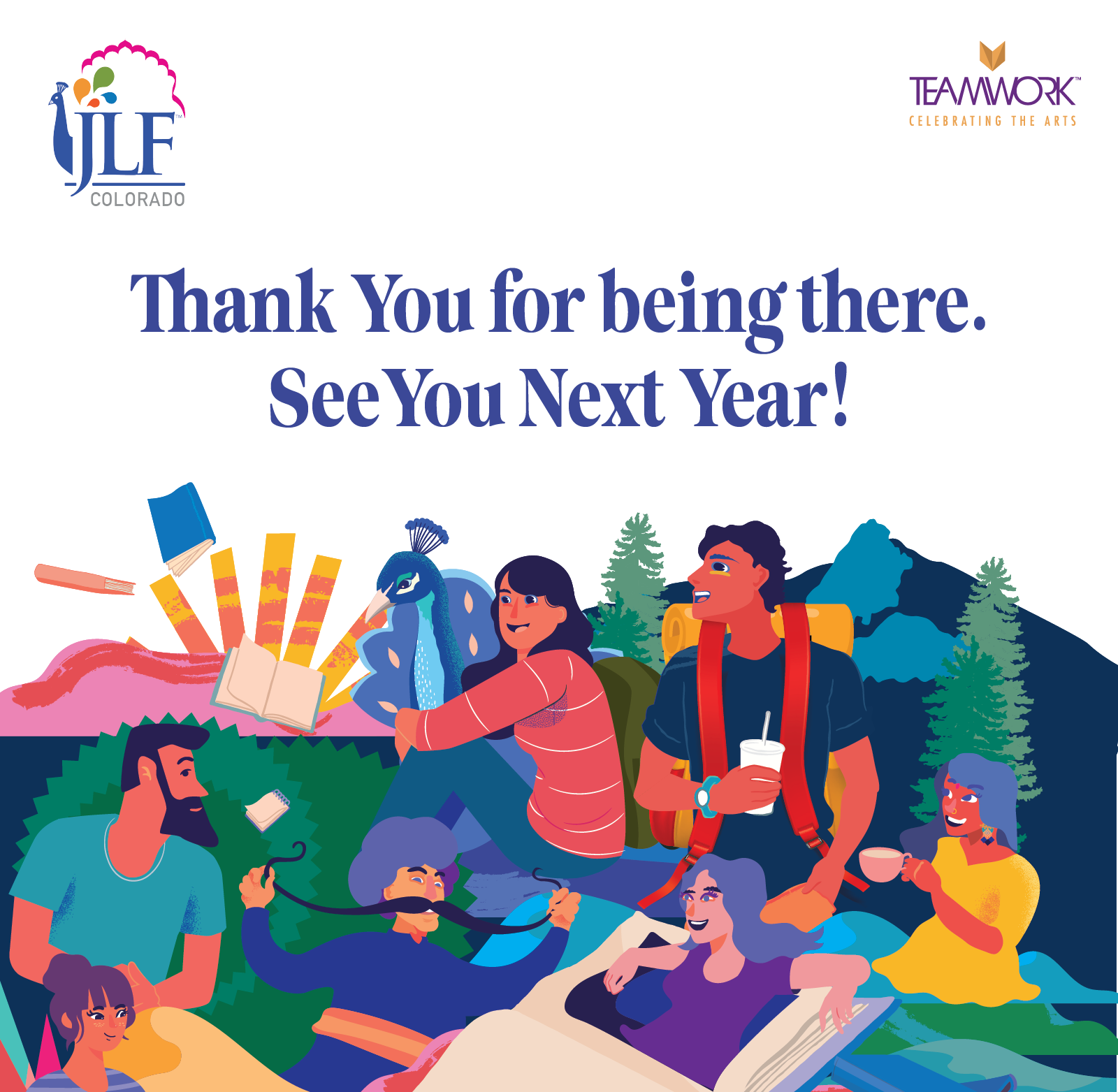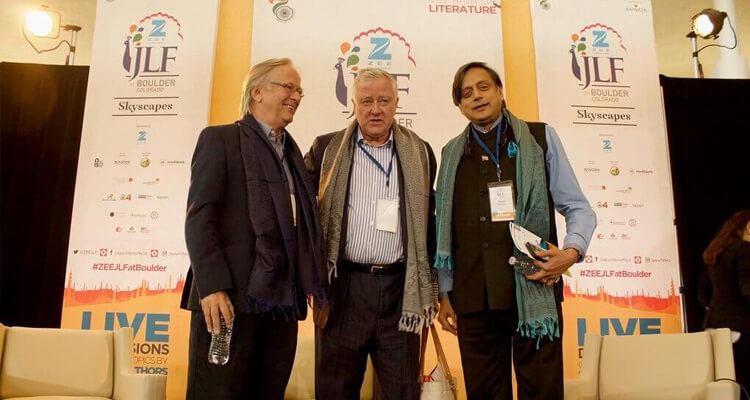


Jaipur lit fest spreads its ‘joie de vivre’ to America
By John Elliott, Riding the Elephant blog – https://ridingtheelephant.wordpress.com
Boulder Colorado success last weekend after an evening in New York
“What an industry these lit fests spawn,†a friend emailed when I told him last weekend that I was at JLF Boulder, JLF being the shortened name for India’s internationally famous Jaipur Literature Festival that has sprung up in London, Melbourne and New York as well as Boulder, Colorado.
I initially resisted the thought that such fun-oriented literary and mostly free extravaganzas could be termed an industry but, on reflection, maybe they are. Though they are not driven by the publishing industry (that’s done at book fairs), they are part of the creative industries and JLF, like Britain’s famous Hay Festival, is becoming an increasingly recognisable international brand.
The branding is vitally important because JLF depends on sponsorship for 85% or 90% of its funding and therefore for each location’s survival. The primary title-named sponsor is now India’s Zee television and entertainment group, but many other companies are need to help finance individual platforms and sessions.
There must of course to be something special to make a brand successful and in the case of the JLF it is primarily the wide range of authors and speakers from different parts of the world, different languages, ethnic groups and religions, all milling together on the stage and with audiences.
“We are recognised in the area of arts and literature bringing together the Orient and Occident and we try to make that the experience,†says Sanjoy Roy, managing director of Delhi-based Teamwork Arts that produces the events,
But the buzz which is at the heart of the Jaipur festival and erupted at Boulder comes from more than that.
“JLF still somehow has the feel of a bunch of friends holding a party rather than the more worthy feel of some of the other festivals,†says British author William Dalrymple, one of the festivals’ two co-directors.
“That is why the best writers usually accept our invitations, if they are not deep in a book: because they know they will have a good time, be beautifully looked after, and meet other top flight writersâ€. (He added “and probably end up dancing with them,†because there are music sessions at the end of a day’s literary events).
Dalrymple also says that the programming “is the best in the businessâ€. He does that in constructive tension with Namita Gokhale, an Indian author. “I think there is a genuine joie de vivre about in the Jaipur team that manages to turn up the voltage wherever we pitch our tent,†he says.
Gokhale focuses primarily on writers and speakers in Hindi and other Indian and South Asian languages as well as international languages, while Dalrymple attracts names from around the world. Together they provide a linguistic and ethnic mix on a scale that is not seen in other festivals.
“It is one of the few festivals curated by two writers who bring a wide range of interests and sensibilities,†says Gokhale.
There is a strong emphasis on freedom of expression, which regularly infuriates extremists of various hues.
Xiaolu Guo, a Chinese novelist and filmmaker, underlined that in 2014 when she said, during a Who Rules the World debate, that China could learn from the way that “everyone here is equal, everyone has the right to listen and to get informationâ€. If China allowed that, she said, it would be a better country.
JLF tends to go where it is asked, rather than seeking destinations. It was invited to New York for the first time on September 10 by the Museum of Modern Art to stage an evening event titled “Patriot Games: Contextualizing Nationalismâ€. In London, it started four years ago as part of a South Asian festival on the South Bank and in May moved to the British Library.
Visitors from Boulder who first went to Jaipur a few years ago asked Roy to bring the festival to their city. “We were attracted by the brilliant, accomplished, gifted writers who discuss their books….and the community of readers who come to the festivalâ€, says Jules Levinson, a leading Buddhist studies academic.
The Boulder festival was spread over three days and featured more than 60 authors and other speakers from as far afield as South Korea, Australia, the UK, Mexico and Columbia as well as India and the US. Among the most famous was Anne Waldman, an American poet, Alberto Ruy-Sanchez, a Mexican poet and writer, and Akhil Sharma, an Indian author living in New York.
Books ranged from reporting the horrors of North Korea and sexual abuse in the American Catholic church to a thriller centred on the Everest mountain and Beat generation poetry.
In a session that I moderated (right), former US senator Larry Pressler rued the failure of his once-famous Pressler Amendment to stop Pakistan developing nuclear bombs.
Two top Indian diplomats talked about their double life as prolific authors. Vikas Sarup, High Commissioner to Canada, told the story of Q&A, the novel that became the highly successful Slumdog Millionaire film. Navtej Sarna, ambassador in the US, talked with me about his nine books, many centred around his home state of Punjab and his Sikh heritage and religion.
The lit fest in Jaipur began in 2006 in the grounds of the Jaipur’s Diggi Palace hotel, a charmingly faded pile built in the 1860s as a grand town house for a rural ruler. In 2008 it came under Teamwork, which has Ambit Pragma of Mumbai as its primary investor.
Since 2006, 115 lit fests have cascaded across India and the rest of South Asia, starting with Galle in Sri Lanka and including Karachi and Lahore in Pakistan, Kathmandu in Nepal, Thimphu in Bhutan, and Dhaka in Bangladesh. Writers with new books to peddle often tour the circuit, taking in India’s Delhi, Calcutta, Chennai, Hyderabad, Bangalore, Goa and Mumbai in addition to Jaipur and more in the Himalayan foothills at Kasauli and Shimla.
Hundreds of thousands
The number of people attending Jaipur mushroomed from a few hundred in the early years to 27,000 in 2010, and 255,000 in 2015 (that’s the footfall count including repeat visitors). In January this year, there was an astonishing total of 400,000 footfalls over the five days with 80,000 registered visitors.
It is free and open to all, though there is an option to become a delegate with access to authors’ lounges and various meals and events for between Rs6,000 ($92.5, £58.5) a day and Rs22,000 for the five days.
It is the free aspect which is vital to Jaipur’s image and success with the general public, including hordes of school children, mixing with an eclectic selection of Indian and international writers and other public figures. There are complaints every year that it is too crowded but few people really mind the crush, which comes with the event’s success.
“Whether you want to hear about the provision of toilets and treatment of excreta in India or the life and times of a transgender, or listen to one of Britain most famous comedian personalities or a pressured Indian bureaucrat defending his patch, or how the US has caused chaos in the Middle East ousting established regimes, the Jaipur Literature Festival was the place to be last weekend,†I wrote on this blog last year.
Margaret Atwood, the veteran Canadian writer, had opened the festival, saying “we become writers because we love to readâ€, and “the writer’s ‘other half’ is the readerâ€. She was followed by famous names such as novelists Colm TóibÃn, Marlon James and David Grossman, and writer and television personality Stephen Fry.
Even in the early years there were top names. In 2010 there was a Nobel laureate as well as Booker and Pulitzer prize winners among the famous names that included Wole Soyinka, Roberto Calasso, Hanif Kureshi, Niall Ferguson, Roddy Doyle, Anne Enright, Tina Brown, Claire Tomalin, and Michael Frayn.
JLF’s international reach has a benefit for India. Navtej Sarna described it in London last year as “the single most important part of our soft powerâ€. In Boulder he said, “India is now known as a ‘literary destination’ and the Jaipur Literature Festival is the reason for it.â€
So whether it is or is not an industry, JLF is an international phenomena that has developed haphazardly over the years with the breadth of India’s culture as its springboard. That’s the basis for a successful brand – with Venice, Oslo and Singapore as places that it might pop up in the future.



Leave a comment